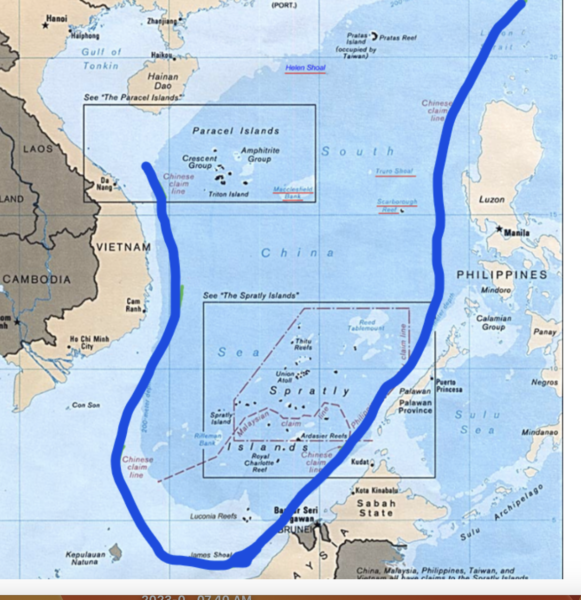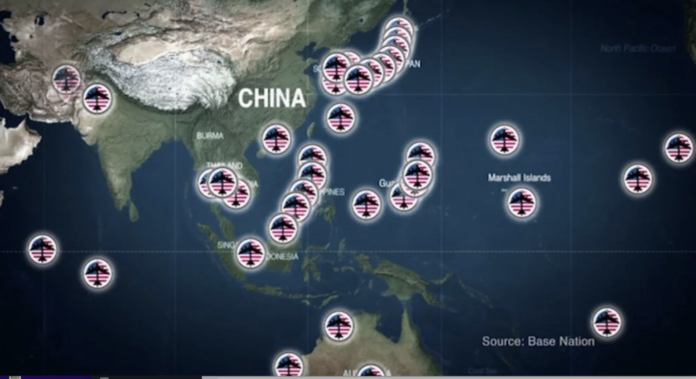Papua New Guinea some examples of instability
Papua New Guinea is an example of a young nation struggling to establish stable governance. Last week it provided a couple of examples of issues that are indicative of this struggle
Legal challenge to Papua New Guinea’s security arrangement with the United States
On 31 August, Papua New Guinea’s Supreme Court received a petition from the country’s opposition to review the legality of the new defence agreement with the United States. The basis of the challenge is the exemption from Papua New Guinean law provided to American service people. This is a relatively standard exemption designed to protect American service people; and essentially means that the protection extended to diplomats is extended too military personal so that they are not subject to ‘political’ prosecution in foreign countries. The service personnel are still subject to United States military law.
A Lowry Institute Pacific analyst, Mihai Sora quoted by Radio New Zealand said that Papua New Guinea’s Prime Minister James Marape probably has enough political influence to retain support for the defence agreement. However, this situation is a good example of the concern that the agreement has caused in Papua New Guinea and is the latest in a series of protests.
An interesting observation though is how easily legal processes can entwine with politics, the courts being used to argue political points in a manner that arguably does not happen in older and more entrenched democracies. It would be eye-opening for opposition parties in Australia or New Zealand to be appealing to those nation’s Supreme Courts about issues of foreign policy. Yet, in the last couple of weeks this has happened in Vanuatu and now in Papua New Guinea hinting at a less stable political systems.
Papua New Guinea forms new police unit to combat inter-tribal warfare
Papua New Guinea announced last week that it is forming a new specialist police unit to tackle inter-tribal fighting. The unit will be a well-armed elite unit with a remit to engage tribal gangs aggressively.
Papua New Guinea is a poor nation that has a massive land area, consisting of rugged mountains and jungle. Some communities are remote and the rule of law is relatively tenuous in some places, so sometimes there are still local battles between rival tribal groups.
This low-level warfare destabilises some rural areas, costs people their lives and makes it hard to get foreign investment in the nation. That warring tribal gangs are active and need to be suppressed provides an indication of how short the reach of government is in some parts of the Pacific. This type of violence is also indicative of how easily law and order can break down. And; when the rule of law breaks down, stable governance is threatened and political processes can be more easily influenced by external agents; either business interests or foreign countries. It is important that across the Pacific, policy makers are aware of this issue and support other nations to maintain stable government and the rule of law.
More drama in the South China Sea
China recently released its latest edition of the ‘standard map of China,’ or China’s interpretation of its international boundaries and borders. The map is not supported by international law and includes questionable interpretations of borders. For instance, an interesting change is that Russia has lost half of Bolshoi Ussuriysky Island, a small island on the junction of the Ussuri and Amur Rivers. After negotiations, one half was ceded to China in 2008. However, in the new ‘standard map’ the whole island is now part of China. It is interesting that Russia has not protested, and perhaps says something about these nations’ new relationship.
China is using similar tactics in the South China Sea drawing its ‘standard map’ to match Chinese interpretations rather than international law. In this case an interpretation that is often called the ‘Nine Dash Line’ that claims almost all the South China Sea as Chinese territorial waters. The map below provides a rough picture of the area claimed by China.

This low-level warfare destabilises some rural areas, costs people their lives and makes it hard to get foreign investment in the nation. That warring tribal gangs are active and need to be suppressed provides an indication of how short the reach of government is in some parts of the Pacific. This type of violence is also indicative of how easily law and order can break down. And; when the rule of law breaks down, stable governance is threatened and political processes can be more easily influenced by external agents; either business interests or foreign countries. It is important that across the Pacific, policy makers are aware of this issue and support other nations to maintain stable government and the rule of law.
More drama in the South China Sea
China recently released its latest edition of the ‘standard map of China,’ or China’s interpretation of its international boundaries and borders. The map is not supported by international law and includes questionable interpretations of borders. For instance, an interesting change is that Russia has lost half of Bolshoi Ussuriysky Island, a small island on the junction of the Ussuri and Amur Rivers. After negotiations, one half was ceded to China in 2008. However, in the new ‘standard map’ the whole island is now part of China. It is interesting that Russia has not protested, and perhaps says something about these nations’ new relationship.
China is using similar tactics in the South China Sea drawing its ‘standard map’ to match Chinese interpretations rather than international law. In this case an interpretation that is often called the ‘Nine Dash Line’ that claims almost all the South China Sea as Chinese territorial waters. The map below provides a rough picture of the area claimed by China.
The situation in the South China Sea is often interpreted as an example of ‘hybrid war,’ or powers fighting for advantage in the ‘grey areas’ below armed conflict. China’s hybrid war strategy dates to 2003 and is called ‘Three Warfares’ doctrine. The doctrine outlines three key strategies, or areas of activity for hybrid war that include:
-
- Psychological war – Using bullying tactics and intimidation to deter a potential enemy.
- Information war – Using propaganda to support political or military objectives.
- Legal war – Using international forums and law to support political or military objectives.
By producing ‘standard maps’ and occupying artificial islands on reefs in the South China Sea, China is seeking to create a pseudo-legal case for ownership of the area within the ‘Nine Dash’ line.
The new ‘standard map’ is an example of information war, or using propaganda to present a case. In turn, this activity is supported by looking for support in international forums for China’s position. China makes its claim based on historic records that although not generally accepted provide an example of ‘legal war’ or developing legal justification to support a political or strategic position. By using non-military ‘Coast Guard’ vessels to bully and intimidate other nation’s ships in the area China demonstrates it is willing to use coercive force, ‘psychological war’ designed to deter other nations from using force.
However, unlike Russia some nations are vigorously protesting China’s new map. Last week, India, Vietnam, Taiwan and Malaysia all protested. The Malaysian Foreign Ministry stating that “Malaysia does not recognise China’s claims in the South China Sea as outlined in the ‘2023 edition of the standard map of China’ which extends into Malaysian maritime area.”
And; we can expect to see more protests in coming weeks. However, the lesson is that the most effective strategy to combat hybrid war tactics is knowledge and understanding. If countries are aware of these strategies being used then they can work together to counter misinformation, deter intimidation and to support the international rule of law. A good lesson as Sino-American tensions increases further south in Melanesia.
More from the Melanesian Spearhead Group meeting
Last week, more information became publicly available about the recent Melanesian Spearhead Group meeting in Vanuatu.
The group agreeing to advocate to the French President about the 2021 sovereignty referendum held in New Caledonia.
New Caledonia is a French colony. France is one of the few European nations to retain colonies in the Pacific and the indigenous people of the islands, known as Kanaks are of Melanesian descent and wish to be independent of France. In the 1980s New Caledonia was subject to a level of political violence.
Overtime, France and the Kanak independence movement the Front de Libération Nationale Kanak et Socialiste (FLNKS) have tried to negotiate a settlement and in 2018 and 2020 referendums on the issue of soveriegnty were conducted, each returning majority support for remaining a French colony.
In 2021, another sovereignty referendum was held that returned a 96% result in favour of staying a French colony. The issue is that FLNKS did not support the referendum and told Kanaks not to vote because polling put people at risk of COVID.
Since then, the FLNKS has been seeking international support for its position that the 2021 referendum is not legitimate. The Kanak people are represented on the Melanesian Spearhead Group by FLNKS and the group agreed to support FLNKS claim that the referendum is invalid, writing to France’s president and supporting the group’s advocacy to the United Nations.
This situation provides a good example of colonial tensions in the Pacific. Kanaks make up about 40% of New Caledonia’s population and the colony is heavily subsidised by France, meaning that referendums are unlikely to result in support for independence. This means that the issue of Kanak independence is likely to simmer for many years yet.
British Foreign Secretary James Cleverly visits China
Last week, British Foreign Secretary James Cleverly visited China. The first visit by a senior United Kingdom diplomat in five years. Although nothing significant has come from the meeting this visit is an important diplomatic intervention because it is an opportunity to renew relationships.
The United Kingdom is committed to the Pacific through a range of defence agreements and partnerships. So, its relationship with China is important to all Pacific nations. After recent tensions, it is good to see the United Kingdom and China engaging in dialogue because it is always better to be talking rather than fighting.
Korean Peninsular update
The Korean Peninsular remains tense. South Korea, Japan and the United States conducting joint naval exercises and then on 31 August North Korea conducting a threatening exercise simulating use of tactical nuclear weapons against South Korea.
The South Korea, Japan and the United States naval exercise practised defence against missile attacks specifically the inter-operability required to detect incoming missiles and then quickly share information between the three navies ships so they can be intercepted.
North Korea’s exercise included launching missiles into the sea, a capability demonstration designed to demonstrate that North Korea has sophisticated missiles and can use them effectively. A counter to the South Korea, Japan and the United States naval exercise.
Essentially, this part of the Pacific is engaged in battle of deterrence; or threat and counter threat as all parties demonstrate that if there is a conflict, they are ready. Although, tensions are high this area is heavily monitored and many layers of diplomatic safeguards exist to prevent escalation. So, war remains unlikely.
Ben Morgan is a bored Gen Xer and TDBs military blogger





If some are upset with the details of the CCP’s latest imaginary maps, wait until the one with the 145 Dash Line comes out.
Have you seen the map Bruce? If not, then who is imagining things?
Smells like imperialism
….the protection extended to diplomats is extended too military personal so that they are not subject to ‘political’ prosecution in foreign countries.
Now why on earth would a ‘politically’ friendly state that has agreed to host a US military base, then want to bring a ‘political’ prosecution against an American soldier serving at that base?.
To host a US base is a political decision of support from the host state. For the host state to then want to prosecute personal of that base on ‘political’ grounds makes no sense.
Sounds like bullshit to me.
More likely the host state would want to prosecute a US military person who had broken the host country’s laws and offended against the local population.
Inserting the word ‘political’ is a cover.
This is a general amnesty giving the right of the US military forces in that country to ignore and break the laws of that country.
This is the definition of what imperialist states do in other countries.
We are not imperialists, of course not. Because…
All imperialists are genocidal.
https://www.independent.co.uk/news/uk/home-news/worst-atrocities-british-empire-amritsar-boer-war-concentration-camp-mau-mau-a6821756.html
https://www.aa.com.tr/en/americas/us-history-riddled-with-massacres-genocide/2261696
No imperialist power wants its crimes acknowledged in a court hearing, neither do they want it pointed out in a public hearing that they are even imperialists.
To project their power and protect their overseas interests, all imperialists maintain overseas military bases.
https://ecfr.eu/article/chinas-new-military-base-in-africa-what-it-means-for-europe-and-america/
Imperialists generally exempt their armed forces from being subject to legal proceedings of the host country where they keep a military presence.,
Imperialists also exempt their military forces from the international criminal court and for the same reasons that they exempt themselves from local court proceedings.
https://www.theguardian.com/world/2016/nov/16/russia-withdraws-signature-from-international-criminal-court-statute
I wonder if Ben Morgan would be as sanguine about it if the Russian or Chinese imperialists set up a military base on New Guinea territory and exempted themselves from all local laws.
To maintain their power and exert their authority in their foreign territories, history tells us that war crimes and genocide are something all imperialists inevitably commit. For this reason no imperialist power cannot afford to risk their military personal being tried in local, or international, criminal courts.
….courts being used to argue political points in a manner that arguably does not happen in older and more entrenched democracies…. Ben Morgan
Japan is an older and more entrenched democracy that has US bases on its territory.
The people of New Guinea are not the only people to challenge the protection from prosecution of US military personal who have committed crimes against their people.
https://www.stripes.com/theaters/asia_pacific/okinawans-protest-u-s-japan-status-of-forces-agreement-1.14775
In fact the Japanese Legal authorities have more right to take cases against US military personal than what what Ben Morgan suggests should be allowed to the people of New Guinea. And the Japanese people only achieved this, after decades of protest and legal challenges.
I wonder. Are Ben Morgan’s comments, that the young democracy of New Guinea shouldn’t have any right to challenge the special legal protections and privileges afforded foreign military personal in their country, Condescending? Patronising? Superior? Colonialist? Imperialist?
We couldn’t be imperialists? Surely not?
Comments are closed.